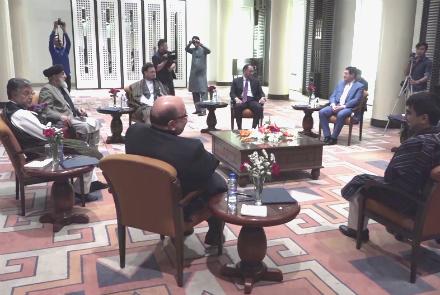As US Special Representative for Afghanistan Reconciliation, Ambassador Zalmay Khalilzad continues his efforts for brokering purposeful talks with the Taliban, aimed at ending the conflict in Afghanistan, some of Afghanistan’s mainstream political parties on Thursday said they have established independent peace negotiating teams to talk to the Taliban.
Jamiat-e-Islami, which is led by acting minister of foreign affairs Salahuddin Rabbani, General Abdul Rashid Dostum-led The National Islamic Movement of Afghanistan and Gulbuddin Hekmatyar-led Hizb-e-Islami are among the three parties which have created their own separate teams to negotiate with the Taliban insurgents.
Meanwhile, President Ashraf Ghani in a meeting with Khalilzad in Kabul on Thursday said the joint efforts by the Afghan government and the US will help in bringing peace to Afghanistan.
Khalilzad met Chief Executive Abdullah Abdullah alongside the president.
The discussion centered on Khalilzad's regional engagement and Afghan preparations for negotiations to reach a political settlement on the conflict, the US Embassy in Kabul said in a statement on Thursday.
President Ghani’s Office said in a statement that the meeting was held at the Presidential Palace where the Afghan leaders and the US special envoy discussed issues around Ambassador Khalilzad’s multi-nation tour for Afghan peace.
In this meeting, President Ghani appreciated Khalilzad’s efforts for Afghan peace and said the Afghan government announced its negotiations' team at the Geneva Conference on Afghanistan late last month, the statement said.
“Our will for ensuring peace in Afghanistan is serious,” Ghani said, as quoted in the statement.
Although last week, the president offered his peace plan at the conference, political parties now say that they have created their own teams to talk.
According to the political parties, the seven-member peace negotiating team will meet the Taliban officials in a foreign country.
“The political parties have held a series of discussions recently and decided to play their religious and national obligations regarding the peace process, and create an inclusive environment for a serious agreement between the government and the Taliban Islamic movement. The Taliban are prepared to engage in discussion with the political parties to find a settlement to the war in Afghanistan. Also, the political parties are willing to play their role in ending the war and restoring lasting peace in Afghanistan,” said Humayoun Jarir, member of Hizb-e-Islami party.
“Whatever we do is carried out from the platform of the peace committee of Jamiat-e-Islami Afghanistan. We believe that the resistance front should be one of the key actors in the peace process,” said Noor Rahman Akhlaqi, member of Jamiat-e-Islami party.
“The political parties urge inter-Afghan dialogue. Inter-Afghan sides could be three sides, including the Taliban, government and political forces which are outside of the government,” added Jarir.
“The Taliban and opponents are not ready to engage in negotiations with this board or committee (government’s peace negotiating board). Therefore, the political parties decided to nominate a committee for this purpose,” said Abdullah Qarloq, member of The National Islamic Movement of Afghanistan.
“If these efforts are created within the framework of the government, it will be very good, it is good to raise the voice for peace from a united front rather than several fronts,” said Jalaluddin Badr, a political analyst.
According to the US Department of State, Ambassador Khalilzad’s trip includes Afghanistan, Pakistan, Russia, Uzbekistan, Turkmenistan, Belgium, the United Arab Emirates and Qatar. The trip will continue until December 20.
The trip is aimed at supporting and facilitating an inclusive peace process in Afghanistan, while empowering the Afghan people to decide their nation’s fate, the US Department of State said last week.

